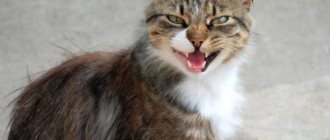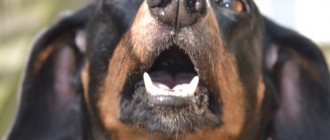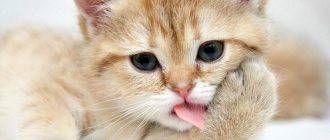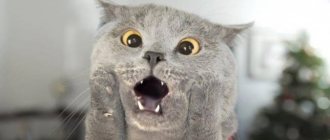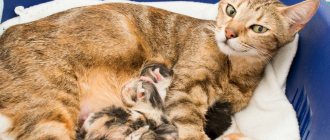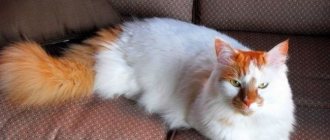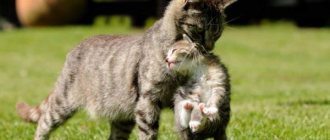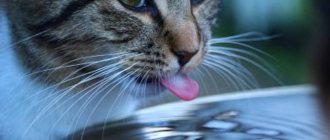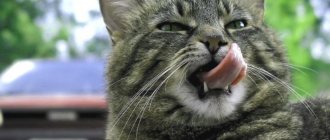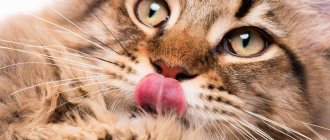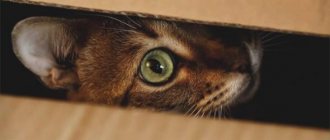Features of breathing in cats
It’s worth starting with the fact that among the reasons why cats switch to this type of breathing, there are physiological ones, that is, those that are normal and pathological ones, caused by various diseases.
One of the cases of physiological mouth breathing in cats on video.
But, of course, this is rather a pleasant and funny case when a cat breathes with its mouth open. But this is not always the case. Mouth breathing, caused by physiological reasons, usually does not last long, immediately after oxygen saturation, the body returns to normal mode. Happens when:
- High ambient temperatures are more common in long-haired and plush breeds.
- And also after intense physical activity, especially in cats with severe obesity.
How to provide first aid to an animal?
In most cases, the best treatment for a cat with breathing problems is to take her to the hospital immediately. By trying to do something on their own, owners are only delaying time, which aggravates the situation. At the slightest suspicion of pathology of the heart, lungs or other organs, you need to call a veterinarian or take the cat to him. However, there are exceptions to the rules :
- For example, if a pet breathes through its mouth and a foreign body gets into the throat. In such cases, even a person without medical education is able to provide first aid. You need to open the cat's mouth wide, pull on the tongue and try to pull out the foreign body with your fingers or tweezers. If it is not stuck deeply, this will most likely be possible.
- In cases where a foreign object has entered the trachea, you can try to turn the cat upside down, lift it by the hind legs and squeeze the stomach in the diaphragm area. As a rule, a foreign body pops out as a result of such manipulations. If this does not happen, the animal must be urgently taken to the doctor.
© shutterstock
It happens that the cause of rapid mouth breathing is poisoning. If you have reason to suspect this factor, you should call a doctor and immediately begin providing first aid.
First, give the cat plenty of water with a weak solution of potassium permanganate. The more liquid you can add, the better. In case of poisoning, it is important to rinse the stomach as quickly as possible before toxic substances enter the intestines and blood.
Causes of mouth breathing
The causes of heavy mouth breathing in cats due to illness are much more extensive. The main function of the respiratory system is to saturate the body with oxygen when inhaling and removing carbon dioxide when exhaling. The upper and lower respiratory tracts, lungs and respiratory muscles participate in this gas exchange.
A disruption in the functioning of any of the components leads to a malfunction in the system and oxygen starvation; in order to compensate for the lack of vital O2, the body has to change the type of breathing. Let us consider in more detail the pathologies that can cause acute respiratory failure. They are divided into two groups: the pulmonary form, which is directly related to diseases of the respiratory system, and the ventilation form, which is a gas exchange disorder caused by extrapulmonary diseases.
| The pulmonary form includes |
|
| Violation of central regulation and patency of the nerve impulse |
|
| Muscle disorders |
|
| Disorders related directly to the chest |
|
| The course of respiratory failure may be |
|
And it depends on the reasons that caused the pathology. One of the most common is pulmonary edema.
Why does a cat breathe through its mouth like a dog?
Your pet may have a brain disorder. There is indeed a center in the brain that is responsible for the breathing of the animal.
Why does a cat breathe through its mouth like a dog?
- Therefore, when it is damaged, breathing may be impaired. This usually occurs as a result of benign or malignant tumors in the head, or after strokes.
- Therefore, if your pet recently jumped from a cabinet, fell, or hit its head, then it is quite possible that breathing problems were caused by a head injury. This requires doctor's consultation and treatment.
- A cat may inhale with its mouth open due to infestation with worms. Some parasites live in the lungs, releasing large amounts of toxins and poisoning the animal's body. Therefore, the pet tries to cough up toxins.
Pet
Pulmonary edema in a cat
Pulmonary edema is a condition in which the level of fluid in the lungs is higher than normal. Blood plasma leaves the vessel and fills the intercellular pulmonary space. The lungs increase in size, but can no longer fully perform their direct function.
The reason for oxygen starvation during edema is that with each breath, the accumulated liquid tends to foam. From one milliliter of such liquid, about 15 milliliters of foam are obtained.
As it accumulates, it fills the airways and significantly increases the load on the respiratory muscles. The oxygen that enters the lungs simply does not reach the alveoli, mixing with foam bubbles. As a result, respiratory failure progresses.
Specifics of diseases of purebred cats
In some purebred animals, as well as their mixed breeds, edema can be caused by heart failure. If we talk about breeds, the most predisposed are Scottish Fold, Oriental and Abyssinian cats, Sphynxes, Cornish Rexes and Maine Coons.
Symptoms of pulmonary edema in cats and kittens
Video about the symptoms of pulmonary edema in cats and dogs
As for clinical symptoms and manifestations, at first there is lethargy, complete or partial loss of appetite, and decreased activity of the cat. Over time, anxiety, shortness of breath (the cat breathes through its mouth), and tachycardia appear. Lack of oxygen causes cyanosis of the mucous membranes.
More severe conditions are accompanied by wheezing, initially dry, then wet. White foam appears from the nose and mouth, sometimes mixed with blood. Coordination and heart rhythm are impaired. The outcome of respiratory failure can be a hypoxemic coma, as a result of the death of brain cells due to lack of oxygen and the death of the animal, if it does not occur earlier due to the severity of the condition.
Frequent, difficult breathing through the mouth and cyanosis (blue color of the oral mucosa) require urgent treatment at the hospital for examination by a veterinarian. Since the reason that caused this condition can threaten health and even life.
Why does a cat stick out its tongue and breathe frequently?
Frequent breathing with an open mouth can be caused by hair getting into the respiratory tract.
Why does a cat stick out its tongue and breathe quickly?
- Cats can lick and preen themselves for a long period of time, so the hairs get into the respiratory tract.
- In this case, the animal may begin to cough and vomit.
- In most cases, nature provides that the pet simply gets rid of some of the fur from the respiratory tract and intestines by vomiting.
Kitty
Treatment
When a cat with rapid and heavy breathing enters the clinic, a team of doctors immediately diagnoses the cause of the pathology and takes all necessary measures to stabilize the animal’s condition. The owner must provide all the necessary medical history data, so it is better if the cat is brought to the hospital by a person who can answer all the doctor’s questions. Subsequently, the animal is examined and the necessary diagnostic tests are carried out, including blood tests, x-rays, ultrasound, and ECG.
First of all, intensive therapy is aimed at saturating the body with oxygen. In addition, surgery may be necessary. If there is a large accumulation of fluid in the chest cavity, thoracentesis is performed, which is a puncture of the chest with a thin needle to remove the accumulated fluid. If respiratory failure is caused by injuries, the cause is also promptly eliminated. The prognosis is always different and depends on a timely visit to the clinic, the causes of the disease, the severity of the condition and, of course, the quality of the care provided.
What to do if a cat pulls out its tongue?
A sufficient volume of water is an important condition for improving the condition of the animal when overheated.
When a cat sticks out its tongue due to a foreign body, it should be carefully removed. The object is pulled out with tweezers. If a foreign object has moved strongly into the trachea, the animal should be turned upside down with its hind legs and shaken a little. If the cat overheats, place it in a cool place and give it plenty of water. In other cases, emergency veterinary care is always required.
A cat in a car breathes with its mouth open
If you took your pet with you in the car and while driving you noticed that the cat was breathing with its mouth open, most likely the pet was seasick. In principle, this is not so scary, but in the future, before taking the animal anywhere, first prepare for transportation. Key points about transporting a cat:
- do not feed your pet before the trip, but make sure he drinks;
- if the cat in the car begins to breathe with its mouth open, do not disturb the animal, it is better to stop for a while and give the pet a drink;
- do not leave your pet in a car in a parking lot, especially in summer.
Physiological norm
It is normal for a cat to walk with its tongue hanging out in the heat, when under stress, during childbirth, and in some other situations.
Heat
The body of domestic animals is covered with thick hair, and they have significantly fewer sweat glands than humans. In hot weather, body temperature rises, especially during periods of activity. It is difficult for the body to maintain it at a comfortable level - thermoregulation is facilitated by the tongue. Moisture from its surface evaporates, body temperature gradually decreases.
Overheating can be determined by indirect symptoms:
- intensive eye hydration;
- outflow of saliva;
- looking for a cool place.
Owners should turn on the air conditioner or move their pet to a cool room with fresh air to avoid overheating and heatstroke.
Powerful emotions
Experiences and strong emotions are a common cause of changes in behavior. A stressed animal licks its lips, opens its mouth and breathes rapidly. Cats in this state will stick out their tongues and drool. Increased salivation is typical for males due to physiology.
The reaction to stress is considered natural: as soon as the pet calms down, it will hide its tongue. The saliva will also disappear. Owners can speed up the process by picking up the animal and lightly stroking its fur.
Relaxation
There is no cause for concern if your cat sleeps with its tongue hanging out. He is in good shape almost around the clock, but in deep sleep the animal relaxes, does not react to what is happening around him, and does not hear anything.
The tongue also relaxes and increases slightly in length, so the tip protrudes beyond the mouth. This often happens in breeds with shortened muzzles or malocclusions. There is no threat to health.
Interesting fact. In the wild, there are hardly any individuals capable of completely relaxing - danger can lurk everywhere, so animals are always on the alert and do not lose their vigilance. Sound sleep is the privilege of domesticated animals that are not in danger.
Passion
Pets remember their owners' gestures and use them when they are in dire need of communication. They show the tip of their tongue, imitating a smile and attracting the attention of their owners.
Adults, reaching puberty, stick it out, flirting with the opposite sex. Males behave this way when they smell a female.
Respiratory diseases in cats
The group of respiratory diseases of cats includes infectious diseases such as:
- rhinotracheitis;
- calcivirosis (calicivirus infection);
- mycoplasmosis;
- chlamydia.
Making a diagnosis is complicated by the fact that these diseases occur with similar symptoms, and in addition, often together. Thus, one cat can develop several infections at once.
Caring owners usually immediately notice that their cat is breathing with her mouth open and sneezing, she has nasal discharge and lacrimation, or wheezing and wheezing can be heard from a breathing pet. In this case, the general condition of the animal remains the same or a slight lethargy appears. If your cat has completely lost its appetite, you should immediately contact your veterinarian.
When to sound the alarm
When the above reasons for unstable breathing are absent, and the cat feels unwell, you need to pay attention to other symptoms. The presence of these deviations indicates that it is time to contact a veterinarian:
- Cough;
- Heat;
- Wheezing;
- Convulsions;
- Lack of appetite;
- Loss of appetite;
- Vomit;
- Tachycardia;
- Redness of mucous membranes;
- Nervousness or apathy.
We also recommend reading:
Pet: why does the dog refuse to go for walks When and why do kittens change eye color? Why a cat won't accept kittens, and how to deal with it Unusual facts about the cat's nose
The kitten is breathing heavily - the reasons are within the norm
Even if a kitten is breathing heavily and frequently, this does not always mean that there are some serious health problems; the reasons for intense breathing can be quite harmless:
1. Most often, normal increased breathing is associated with stress experienced by the animal. It can be caused by many circumstances:
· any medical interventions and treatment procedures, from injections to taking pills.
· visiting unfamiliar places, for example, a veterinary hospital.
· traveling in a car, bus or other vehicle.
· contact with other animals, children, strangers.
2. The kitten begins to heat. Adults also experience changes in the body such as pregnancy and childbirth.
3. Food absorption.
5. Increased physical activity during games and running.
All these situations do not pose any threat to the life and health of the pet. After eliminating the causes that caused the increase in frequency, breathing returns to normal. It is important to remember that stressful situations can cause other health problems for the kitten and should be avoided if possible.
Heavy breathing as a sign of illness
It is incorrect to say that if a cat is breathing heavily, then some illness is to blame. So, our pets usually breathe heavily in the following cases:
- Fatigue after active games or a long run;
- Aggression towards another unfriendly cat that is nearby;
- Fear (an animal may be frightened, for example, by the noise of a new vacuum cleaner, the roar of a gunshot, a trip in a car, etc.);
- Estrus period and sexual heat;
- Pregnancy and lambing (even after giving birth, the cat may breathe heavily while feeding the kittens);
- Staying in a stuffy and hot room;
- Emotional experiences during sleep (cats often breathe heavily if they see an unpleasant dream).
Changes in breathing in and of themselves are not considered a disease. This is rather a sign of some serious illness. So, difficulty breathing can develop in a pet for the following reasons:
- Foreign object in the respiratory tract - very often, when a cat begins to breathe heavily, the culprit is a pebble, twig or bone that is stuck in the respiratory organs. If something gets into the nasal passages, the cat will begin to sneeze heavily, clear snot will flow from its nose, its eyes will begin to water, and breathing problems may occur. When a foreign object gets into the throat, the cat, in addition to heavy breathing, experiences very strong hypersalivation, the unfortunate animal can gag, has difficulty swallowing, and breathes with its mouth open;
- Infectious and non-infectious diseases of the respiratory system - with rhinotracheitis, calcivirosis, pneumonia, bronchitis, laryngitis, rhinitis, tracheitis, asthma and other ailments of the respiratory system, cats breathe heavily with whistling or wheezing, body temperature rises, animals often catch air with their open mouths, sneeze. In case of infectious diseases, a cat may have yellow-green discharge from the nose and eyes, diarrhea and vomiting may develop, and ulcers may appear on the tongue. Almost always, respiratory diseases negatively affect the animal’s appetite and interest in games;
- Pulmonary edema is a similar ailment in which a cat’s breathing becomes heavy, and can be caused by many reasons: liver and kidney disease, allergies and anaphylactic shock, trauma, heart disease. With pulmonary edema, a cat may lie indifferently, breathing heavily with its stomach and gasping for air with its open mouth, and if you lean your ear to its chest, you can easily hear noises and gurgling. The purr does not eat, does not respond to the owner’s call, the animal’s mucous membranes become very pale;
- Lungworms - if a cat lies and breathes heavily most of the time, refuses food, has a dry cough and severe shortness of breath even with minimal exertion, the culprit may be parasitic worms that have taken a liking to the lungs;
- Heart failure - with heart problems, the animal develops severe shortness of breath, the cat breathes heavily with its stomach, coughs, its mucous surfaces turn pale to a slight blue color. In some situations, foam begins to come out of the nose and mouth;
- Poisoning - if a purr accidentally swallows, for example, an alkali or an acid, she will probably have breathing problems, hypersalivation, convulsions, diarrhea and vomiting, pulse irregularities, trembling;
- Oncology – sometimes cancer of the respiratory system (for example, larynx or lungs, etc.) occurs in animals. With neoplasms, the cat breathes heavily and opens its mouth slightly, often coughs (dry or with purulent-bloody sputum), wheezes, and swallows saliva often and with difficulty. The animal's voice may become distorted as the tumor develops. In addition, the purr eats little, loses weight, and sometimes develops a fever;
- Anemia - pallor of the mucous membranes, rapid or decreased pulse, heavy breathing, apathy and refusal to eat can symbolize that there are not enough red blood cells and hemoglobin in the blood;
- Injuries to the spine, ribs, pectoral muscles, lungs - with such problems, cats try not to use the chest when breathing, breathing from the stomach. Shortness of breath and pain are pronounced. Hematomas and even open wounds and abrasions can be found on the skin. The cat's pulse may be rapid;
- Hypoxia – with oxygen deficiency, which can develop, for example, against the background of heart disease or severe fatigue, cats begin to breathe heavily, they may suffer from nausea (even vomiting), and motor coordination is impaired;
- Obesity – very often overweight cats breathe heavily even after minimal exercise. The symptoms of obesity, as they say, are obvious: the animal’s body weight is higher than normal, and the figure is more like a ball with legs;
- High/low blood pressure – normal blood pressure in cats is 124/80 (almost the same as human blood pressure). With hypertension (when blood pressure is higher than normal), in addition to heavy breathing, cats also experience redness of the eyes, convulsions and unsteadiness of gait, lethargy, and problems with the urinary system if the kidneys are affected. And with hypotension (i.e., low blood pressure), cats become lethargic, drowsy, they may feel nauseous, and purring breathing with such a problem is often noisy and heavy.
